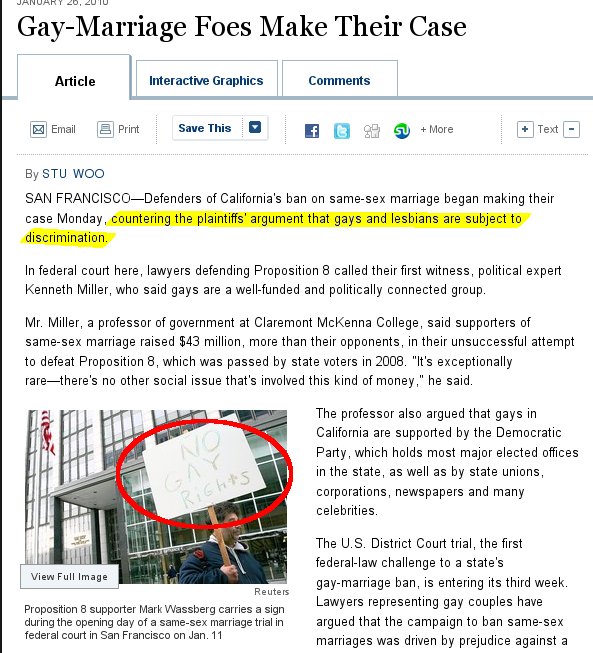Prop-8-Apalooza
If anyone hasn’t gotten their fill of Prop 8 trial coverage, here’s a bundle of links:
First of all, mercurynews.com’s day-by-day coverage of the trial. Mercury being, like, an actual news outlet with presuambly journalistic standards, I figured it’d be best to lead off with them. (Free registration required. Or bugmenot. Or, as it turns out, just leaving JavaScript disabled bypasses their compulsory registration system. Huh.)
The Alliance Defense Fund, who support marriage by refusing it to people who want to get married, have their own roundup.
It’s pretty dry, and generally makes a game attempt at hiding the WTF, mostly by being short on details. But the façade isn’t perfect, e.g.:
Professor Chauncey also had a frustrating habit of falsely linking the motivations of those who supported Proposition 8 to those who supported racial segregation a half century ago. He reluctantly agreed that there is nothing wrong with voters considering their individual moral values to decide how to vote on an issue, but then added that people supported racial segregation because of their moral beliefs. People also use their personal moral values to support environmental legislation or health care legislation. Does that mean those voters are just like those who supported racial segregation?
If you’re one of those weirdos who like facts (ugh! Ptooey!) in their arguments, you might be interested in the American Foundation for Equal Rights’s official trial transcripts.
But my favorite is Autostraddle’s Judgment Daze series. Yes, Rachel and Riese are as biased as the ADF (though in the other direction), but Rachel writes like a gay Wonkette, which counts for a lot, and includes links and videos and tasteful pictures of hot women kissing.
Naturally, both sides think they’ve won, and we won’t know which side really really won until the judge rules in, I think, late February. But I’m feeling cautiously optimistic. As in Kitzmiller v. Dover, the defense witnesses don’t seem to be all that familiar with the value of consistency or critical thinking, things that, I gather, count for a lot in a courtroom, especially when there’s no jury to be swayed by emotional appeals.
I also understand that the prosecution wants to show that Prop 8 was motivated primarily by anti-gay animus, and that a bigoted majority can’t just take away the rights of a minority. Sounds like they did a fine job with the examination of Hak-Shing Tam, who basically regurgitated every homophobic stereotype and urban legend you’ve ever heard, and whom the defense side nudged under the bus a bit.
Other arguments, like “marriage is all about raising children” were countered by, say, the observation that the Netherlands have had gay marriage since 2001 or so, and still does not resemble a Mad Maxian apocalyptic hellscape.
But just in case the judge decides that keeping definitions constant is more important than allowing people to pursue happiness, I think I have the perfect solution:
In the last day of testimony, David Blankenhorn said:
Even in instances of a man engaging in polygamous marriage, each marriage is separate. He — one man marries one woman. That’s the way it works.
The scholars then have pointed out that in certain societies, many societies, men of wealth and power then go on to marry additional women. They do not marry as a group. It is not a group marriage. It permits certain men that have access to power to marry more than one woman. Each marriage is a separate marriage of one man and one woman.
So let’s say a guy marries a woman. He then marries another woman, thus forming a family of three. They then divorce the guy, leaving two women married to each other, all fairly within the confines of the traditional definition of marriage.
It could even lead to a cottage industry of professional brides and grooms, who’ll marry any two people for a reasonable fee.
